Vivienne’s Diary: 21 March – 13 April

This is my friend Sharon, on holiday in India. She used to be my assistant and modeled in Punkature, then she became a Bhuddist nun. Her monastery is in the Scottish borders
I promised to tell you about “Siddhartha” by Hermann Hesse. I read it on the train and whilst still in Paris after the shows.
The general consensus of opinion is that Buddhism had its origins in India in the 7th century BC from a Hindu prince named Siddhartha or as he is often called, Gautama. There is no proof that the Buddha was a historical person just as there is no historical evidence for Christ.
Siddhartha, the hero of Hesse’s novel, is not the Buddha – though he has the same name. He meets the Buddha but does not follow him. The story begins,
It moves on like the song of a river, repeating itself but always telling something new. The reason I read the book is because Andreas, whose senses are so keen, praised the beauty and originality of the writing. He couldn’t get over that someone could write like that, do what Hesse did: think it and find a way to say it; say so much in just over 100 pages. You can read it in a few hours.
Otherwise I wouldn’t have read it because I’m not interested in the Self. Siddhartha wished to conquer the Self. He left home with Govinda to join the Samana.
The Samana were ascetic and half naked wild men who lived in the forest. They practised mind over matter. Govinda stayed with them for three years.
On the day they went to hear the Buddha preach, they left the Samana. Govinda stayed to follow the Buddha.
Siddhartha knew that nobody finds salvation through teaching, that the Buddha could not teach what happened to him in his hour of enlightenment. Siddhartha could not follow him; he had to find his own path. Siddhartha meets the Buddha in a grove and tells him reverently how he has admired his teaching,
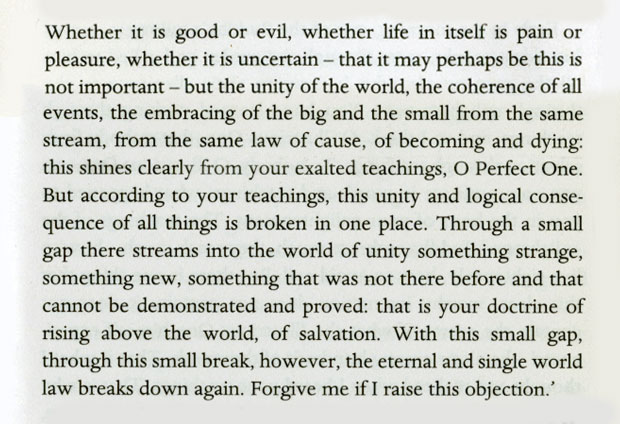
It is interesting to think what this small gap is. To me it means that the world is creative, though it is complete it can absorb something new.
Siddhartha journeyed into the town where he saw the courtesan, Kamala. He formed the intention to learn about love from this most beautiful woman. For this he needed clothes and money. Kamala got him introduced to a rich businessman. She asked him, “Where would you be if Kamala did not help you?”
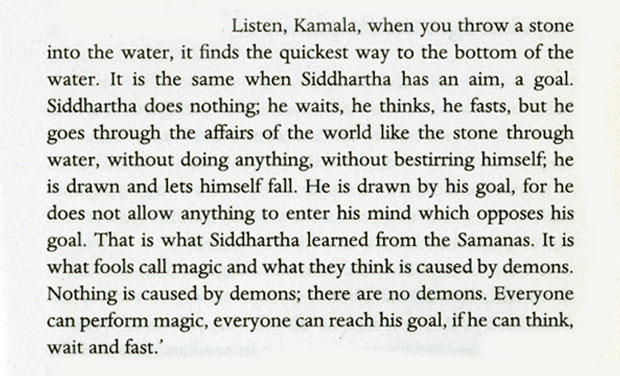
Siddhartha stayed in the town where he delighted in the senses but after many years what had once been a game became an obsession and a sickness. He dreamt that the songbird Kamala kept in a cage died and he left. He longed to die, if only a tiger would come and eat him. He came to a river and leant over towards death – when something happened, something he hadn’t earned, gratuitous: a sound. He was horrified at his crime, the sound filled him and he remembered all his life. He fell into a deep sleep and when he awoke he was happy. The grey haired man laughed to be going backwards beginning like a child. He became a ferryman and learnt to listen to the river.
The river reflected the ever-changing world which is always the same. It directed his observations and his thoughts. The observations are tremendous: When Siddhartha was getting old he met his almost grown up son and fell deeply in love with him, “It was true that he had never lost himself in another person to such an extent as to forget himself.” The son left him and Siddhartha “felt something die in his heart; he saw no more happiness, no more goal.” I think that it is so full of insight to note that he had lost his goal.
Until then, Siddhartha the thinker thought that the difference between him and ordinary people is that they did not think. Because of the wound left by his son “he now regarded people in a different light than previously: not very clever, not very proud and therefore all the more warm, curious and sympathetic.”
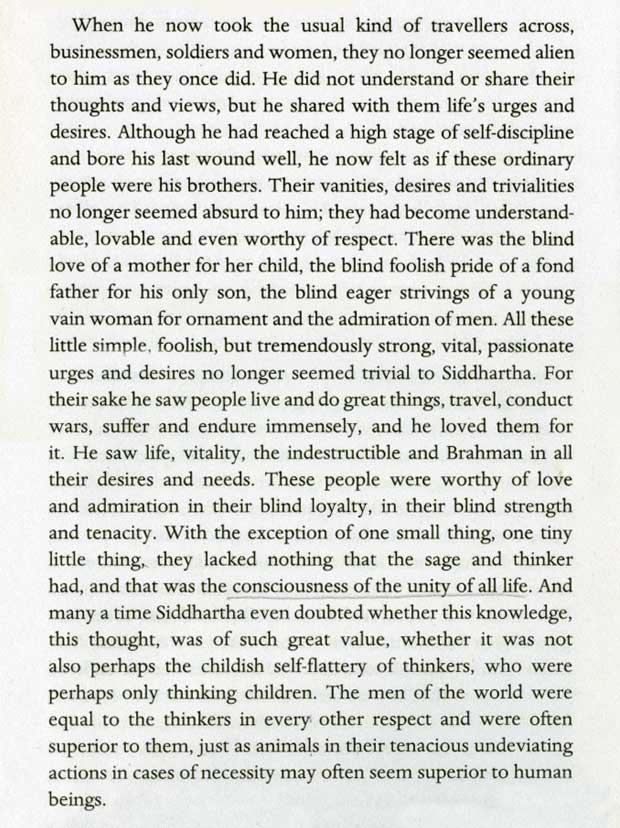
The Buddhist believes in the indestructibleness of life and in re-incarnation. He desires to escape from this cycle by losing his individuality in the universal life. Underlying this is the belief that the material world is an illusion and this probably accounts for the religious beliefs of half the people who ever lived. This was also Siddhartha’s belief and desire.
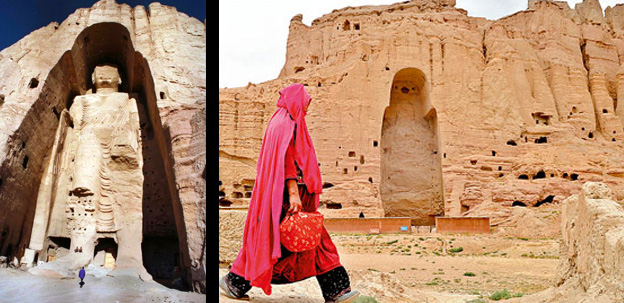
We live in the age of the Iconoclast. The destruction of the Buddhas in Bamiyan, Afghanistan, is the worst example of smashing culture ever performed
I am not a Buddhist and I don’t believe in re-incarnation or the life of individuals after death – I have no interest in it. Also what doesn’t appeal to me is that in acknowledging the unity of the world we therefore accept and love the good and the bad, the new born baby and the murderer; and for example a Buddhist once told me off for talking politics, telling me the only thing you can change is yourself. I want to help make a better world.
Andreas is reading a biography of Hesse and he tells me he came from a family of very strict and intellectual theologians who put him in a lunatic asylum at age 14 because he was too intractable. Hesse travelled and hated everything he saw. He believed in nothing; only that each one had to follow his own path.
By that I take it that Hesse does not judge as to whether Siddhartha achieved his goal.
And although he created Siddhartha and analyses his path he leaves it to Govinda to find again his friend and it is Govinda who experiences Siddhartha as a holy man.And indeed the story is fiction and not a reality.
If I read other books by Hesse I am sure I would also have a fuller idea of this one. This book has been very easy to follow, simple but leaving you a lot to think about. Hesse is an original writer; he broke the mould. Andreas tells me he is considered the possible first modern writer. He loved Tolstoy. His books are many, said to fill the space of one and a half metres on a bookshelf.
We also read “Siddhartha” from our own point of view in time, with a view to its history and its impact.
We should consider the extreme religious intolerance of the protestant strain of the family that Hesse was born into. This still exists today and in other sects as well as Protestant. In the early Protestant theocracy of Calvin’s Geneva a child of nine was taken before the priests by its parents because it had hit one of them. The child was publicly hanged.
Then after the death and evil of World War 1 in the 1920’s when “Siddhartha” was written people sought a different ethic to live under.
Then, because “Siddhartha” was translated into English only in the 1950’s, its impact came in the 60’s! Hippies, India, Vietnam, “Make Love, not War.”
Thursday, 21 March: Andreas and I are at work every day. We are not under pressure at the moment. We are working separately on the other collections and we have begun to choose the fabrics for the next Gold Label. I am clearing up bits and pieces and dealing with requests for all kinds of things that until now I didn’t have time to look at. Cynthia is working hard on Climate Revolution, connecting relationships and discussing events. I think it is so important for other NGO’s we wish to work with to always state their policy from “What’s good/bad for the planet is good/bad for the economy.” I say it again, if we can get the public to see our main message which is staring them in the face we will win the Climate Revolution.
Wednesday, 27 March: Andreas and I went at 9.30 in the morning to a wonderful event at Kew Gardens to celebrate the life of Wangari Maathai. It was wonderful because we hadn’t been to Kew for so long. The magnolia were still waiting for the spring because of the freak cold weather and we had coffee in the orangery where we saw many friends from Wangari’s achievement, the Green Belt Movement. Speeches were by Wangari’s daughter, Wanjira, Prince Charles and Shirin Ebadi, Nobel Laureate. Highpoints were songs by the Revival House Choir and “Hummingbird”, a play performed by the children of Stoneygate College, Leicester.
This was so well composed and conceived by the teachers – words, song, music, costumes. The chorus wore black track suits, half of them were trees – green satin leaves sewn onto the front of the costume and green umbrellas; half were a forest fire with fiery ribbons sewn on and a bunch in the hand to shake. When the fire attacked the trees they put the umbrellas down and turned their backs to us and twisted their bodies into black shapes. The strong animals didn’t know how to use their strength but the humming bird brought water in her beak, “Doing what I can.”
Tree planting, lunch.
What really made it wonderful is the wonderful Wangari and her life. The best I can do is recommend a multi-award winning film: “Taking Root” tells the dramatic story of Kenyan Nobel Peace Prize Laureate, Wangari Maathai, whose simple act of planting trees grew into a nationwide movement to safeguard the environment, protect human rights and defend democracy.
Good Friday, 29 March: Andreas had organized tickets at the Barbican for Bach’s St John’s Passion. I don’t know when it was – say 15 years ago – I would not go to hear this work because I was anti-religious but now I treat the story of Christ as a myth whose purpose is moral regeneration. I was brought up in the Anglican religion and know the bible well. Part of the satisfaction from the work is that the audience gets very involved in the story.
When I finally did go, I was carried away. I have been several times. The underlying rhythm hypnotizes you, supports you, lifts you up with the harmonies and the shifting forms into the ether: you fly. It is glorious and tragic as well as exquisitely beautiful, tender and, above all, light as air: Pure Joy!
Easter Holiday, Saturday, 30 March – Monday, 1 April: During the holiday we stayed at home and I browsed through “The Week”, which is a summary of the week’s news. I rarely read a newspaper except if I’m on a flight I will take a newspaper and read through all the foreign affairs and features. I have no interest in domestic affairs where the main parties compete for the management of the same fossilized point of view and the same policies. I do sometimes catch the news on radio – but I try to see through the propaganda.
Cynthia points out for me any important news she reads online. I read the books of John Pilger and articles by Noam Chomsky to know what really goes on in politics. There are honest political sites online.
Here are some selections from my browsing. The first is Aintree, then next is a series of bullet points I have made from a report by Brian Viner on the new oil boom. Until recently we thought oil was going to peak. Not now. He quotes journalists and oil company representatives:
- “The world runs on oil, period. No other substance can compete when it comes to energy, density, flexibility, ease of handling, ease of transportation. If oil didn’t exist we would have to invent it.”
- “Technology has an unstoppable forward momentum, and what seems mind-boggling now will soon seem old-fashioned.”
- “What is going on out there is the marine equivalent of the space programme.”
- All of it is privately funded. Companies spent £800 billion last year on exploration and drilling.*
- Oil previously thought unreachable is now within our grasp.
- Oil and natural gas reserves are “unfathomably vast”.
- “We, the oil industry, are now able to see what we had previously not been able to see, and find what we had previously not been able to find.” Improvements in seismic technology have made this possible.
- From rigs the deepest well drilled so far is eight miles into the earth – which is deeper than Mount Everest is high.
- So called “seismic vessels” trail between 10 and 20 cables, each up to nine miles long (sometimes these streamers get tangled – “it’s the world’s largest plate of spaghetti”) – probing sonically for oil and gas deposits. With their trailing gear they are easily the largest man-made objects on Earth and they carry up to 400 tons of highly sensitive electronic equipment deployed over an area equivalent to 830 football pitches.
- Fracking is a way of releasing oil or gas that is tightly bound up in shale rock, using immensely powerful water pumps exerting a pressure of up to 20,000 pounds per square inch.
- Tar sand is oil that’s mixed with sand and clay. “the dirtiest source of liquid fuel you can imagine”. The oil is extracted by steam heating the sands.
Oil forever! This is now our future as presented by our media. What about the fact that such activity guaranties the total extinction of most life on earth and the mass extinction of the human race. The true future is one of cause and effect. The new technology would “soon seem old-fashioned” to those who survived. See Bill KcKibben, “Do the Math”.
*Because what’s bad for the planet is bad for the economy our economic system is now too bigger risk for investors and they’re all investing in the future of oil. But we think they will lose their money because cheap renewable energy will compete and expensive new technology for getting at hard to reach oil will “soon seem old-fashioned” before we have to fry.
We are so brainwashed by our media. Everything is framed by our assumptions, so our window on the world is no more than a one way mirror. Last weekend I read on the cover of one of the sections of the “Times” a feature chiding Americans for claiming to be leaders of democracy when we, the Brits, are just as democratic. How’s that for a double assumption?
The propaganda which the media establishment churns out offers no light on the world; instead it holds up a mirror of the false image of ourselves, the one we’ve been conditioned to see.
Here is an everyday example of our embedded assumptions: The financial topic of the week was whether the Chancellor’s budget would help first time buyers or not. No mention of the true need – affordable rents for decent housing.
This is all now old news. I know, but that doesn’t matter. We might as well read it now because we’re going to read it again with the same bias in the near future; in fact, we might as well read the same thing every week.
And let’s not forget the horsemeat scandal: no fewer than 450 different parties – from farmers and butchers to those who sell the different parts of animals, to processors, packers and retailers – might now be involved in the supply chain of a 21st century mass produced lasagne. Climate Revolution says prepare your own food – back to basics, helps you engage with the world, take responsibility for your life. Meat is bad for your health – to me it’s not a scandal that you eat a horse instead of a cow. It’s the same thing. See my diet . But I still haven’t managed to tell you what I eat in the evening.
Honest news was an article in the “Guardian” on Good Friday attributing the exceptional block of cold weather to Climate Change; as the Arctic becomes warmer some weather systems get stuck at the top or the bottom of the jet stream, so that instead of giving a day or two of heat or cold the systems stay for weeks.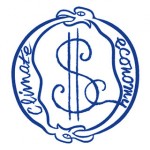
On Monday, 3rd April, the “Guardian” picked up the story again and connected it to financial loss, particularly the number of air flights being reduced because of increased turbulence caused by the changes in the jet stream.
Friday, 5 April: Evening. Manet, unbelievable! The Royal Academy exhibition was exclusively portraits. As I went round I became more and more astonished at the vitality of his work; life caught by strokes of paint – You can get something from a reproduction but you have to experience the physical painting. The economy was overwhelming: “Truth is fiction where the fiction’s true”. Monet told him that he did not need to spend so long being meticulous. Andreas told me to always look at the frames. He’s right, artists themselves knew they were as important as the painting.
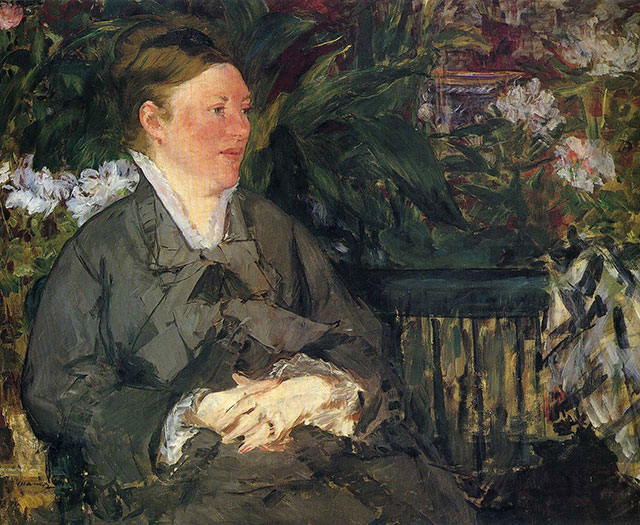
Manet’s wife, Suzanne. Andreas, “The blood in the skin. This image is filled with love. Have you ever seen a kinder person? ”
Saturday, 6 April: Andreas and I did go to work on the weekend – looking at fabric samples, hoping something jumps out. Takes time. It’s started: too much to do, lots looming. Do one thing at a time! I have managed to see friends, including my granddaughter, Cora. I haven’t done much fantastic yoga (two things for health and long life – yoga and don’t eat meat). I’ve actually been super busy trying to clear backlog. But let’s keep on!
Tuesday, 9 April: At 6.00 pm I did something I’ve done before. I needed to hear how Cynthia is getting on with Climate Revolution strategy – Lot’s, I can’t keep up with it. She’s just going to have to wheel me out for events when she needs me (meanwhile I’m planning what information we need to give out at these events). Wait and see…
So I invited a few colleagues and friends to come listen in. Letmiya and Joe Rush came because they have some ideas they want to contribute and I invited our four pattern cutters by way of thanking them for their excellent work last season. I found out they don’t read the Diary – and who do I write it for if not for them? So I see I have to make sure our people know when the blog’s up and I get some kind of feedback from them – even if it’s just “Yes, I read it.” I really know that if you read it regularly you will get a point of view you don’t get anywhere else, particularly on art and culture and how culture, human rights, political economy and Climate Change are all connected. I am going to have to have a meeting of everyone in our building.
Then we all went to dinner.
Saturday, 13 April: Hampstead Theatre, “The Arrest of Ai Wei Wei”. Tell you about it in my next entry.
– We have just heard that Leonard’s transfer to a safer prison has been stopped by high authority in the power hierarchy.
Two days later an email came via Leonard’s Defence Committee. Courage!


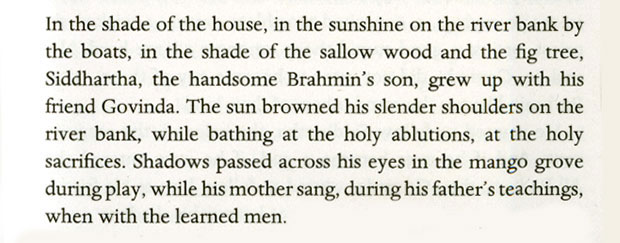
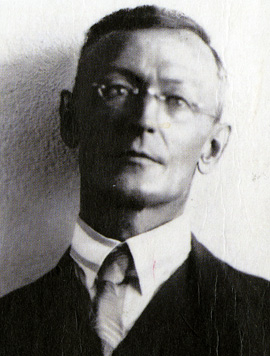
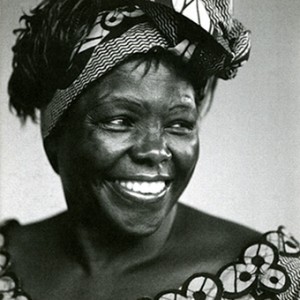
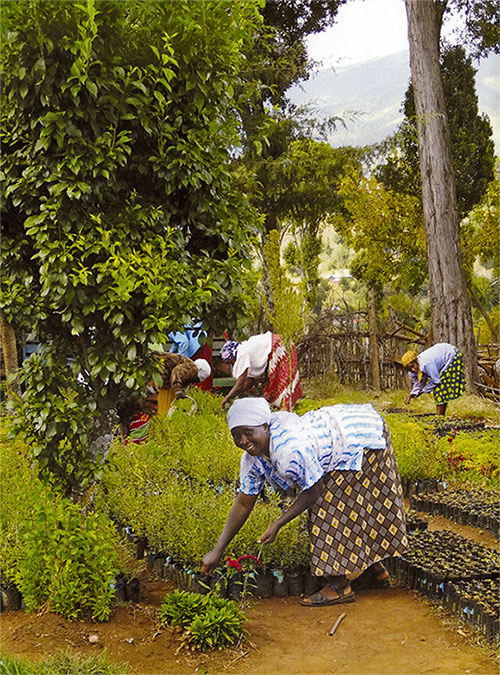

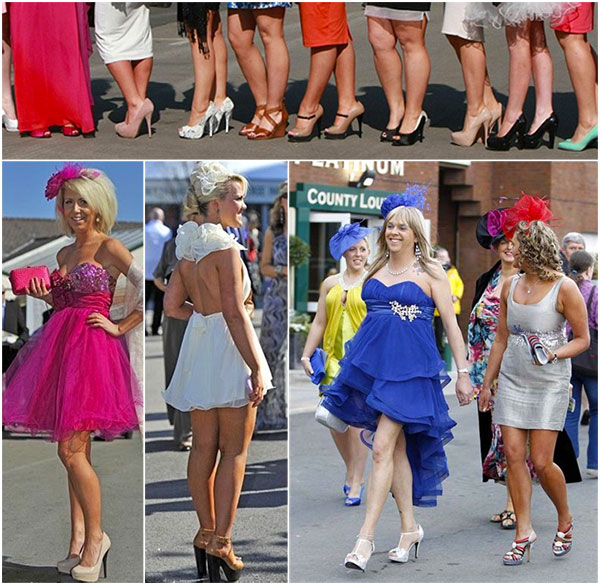
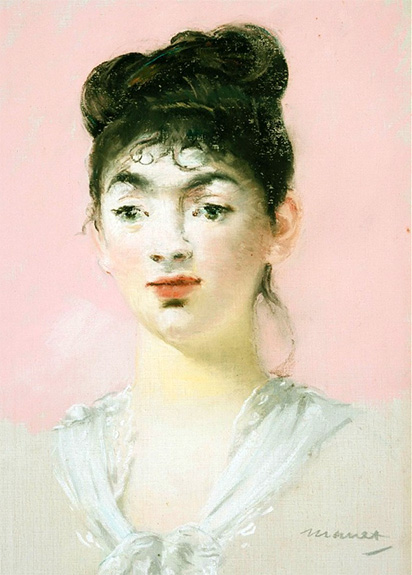


you should encourage us employees to leave comments at the end of your blog entries- that way we are all encouraged to process the information and exchange our own views. That way, who knows, interesting information might come up that could add to all the inspiring things that you mention on here.
It is very easy to notify people whenever an entry goes up…I have no idea why this hasn’t been done when the blog was started. Readers leave an email address and are notified as soon as a new entry is made available to read. The most basic blogs on the net feature this service it should be easy to install it- I recommend you do it here so everybody stays up to date.
I did not know of Wangari Maathai and the documentary moved me to tears at times. Isn’t it great that there are people like her? She is a true saint. One thing to remember is that actions are so much more important than words, they inspire imitation.
Comment by theo on 16/04/2013 at 4:21 pm
A notification does go out to everyone at viviennewestwood each time a new blog goes up. There has not yet been a notification for the current one because there are some changes still to be made. The email should be sent later today.
Comment by Cynthia on 17/04/2013 at 11:23 am
Intractable – hard to deal with or control.
Intractable is an adjective describing high complexity, which makes it difficult to change, manipulate, or resolve an issue, not sure where the word originates from?
Ascetic – not allowing oneself pleasures or luxuries, Asceticism (from the Greek: ἄσκησις, áskēsis, “exercise” or “training”) describes a lifestyle characterized by abstinence from various worldly pleasures, often with the aim of pursuing religious and spiritual goals
Comment by Tizer on 17/04/2013 at 4:44 pm
“I really know that if you read it regularly you will get a point of view you don’t get anywhere else, particularly on art and culture and how culture, human rights, political economy and Climate Change are all connected. ”
This is such a wonderful point Vivienne. I think that this website, the Get A Life and Climate Revolution movements aren’t just something you can pick up from reading one post. It’s an organic process, learning and synthesising what we learn, forming our own opinions from it. I’m really looking forward to where the Revolution takes us – it doesn’t surprise me that people are so reluctant to link the Climate and Economic Crisis in the media, it wouldn’t benefit them at all, would it?
I think your point about “If fashion is a barometer of culture, what do these pictures tell us about the english?” is a really interesting comment, it reminds me of a post some time ago about abstract art and Tracey Emin, and indeed our visit to the National Gallery. We get out what we put in after all, and I think that the English cannot be investing much at all when this is what we (I use the term collectively, I can safely say that I have never worn such a dress 🙂 ) choose to look like!
Thanks for a brilliant post yet again, I hope you had a pleasant birthday and I look forward to the next diary instalment! Best wishes,
James
Comment by James Emmett on 17/04/2013 at 10:08 pm
Marveled over your comments at Hesse. Thought about his importance for our mainstream and alternative culture. Always seeing him as part of a creative/intellectual tandem with C.G. Jung, exploring his own soul/anima in different settings.
Pondering about Jung’s “Red Book”, his calligraphic with notes and illustrations, quite close to what you did in your last Gold label collection.
And being remembered visiting Hesse’s house at Montagnola, Ticino, where some of his correspondence is presented under glass at his desk.
There is a beautiful shortnote by T.S. Eliot suggesting to have tea together.
Thank you for reminding me!
Comment by Bettina on 18/04/2013 at 11:13 am
‘Fracking’ is mentioned in the post and it is an issue I feel people really need to learn more about. Please have a look!!!!! http://www.dangersoffracking.com/
Comment by Murray on 18/04/2013 at 4:31 pm
I agree with James,
It is an organic process, not an instant one. Hence why we have followed the blog for the past few years. I’ve learnt so much from this blog, about polotics, environment, culture, fashion, climate change and Art. It’s a good resource for information and knowledge.
Sam
Comment by Sam Varnham on 20/04/2013 at 3:24 pm
Hey just wanted to say thank you for what.you did and tried to do for bradley manning. It means a lot to supporters in the united states to know that we are not alone. The more people that talk about what is happening with him, the quicker he will be freed. If u would like to talk about bradley, please email me.
Comment by Kevin Limiti on 08/05/2013 at 12:04 pm
It is not true that Hermann Hesse hated every place he visited. He fell in love with the Tessin, where he eventually moved, and spent over 40 years if his life.
Comment by Matthias Schweger on 09/06/2013 at 9:43 am